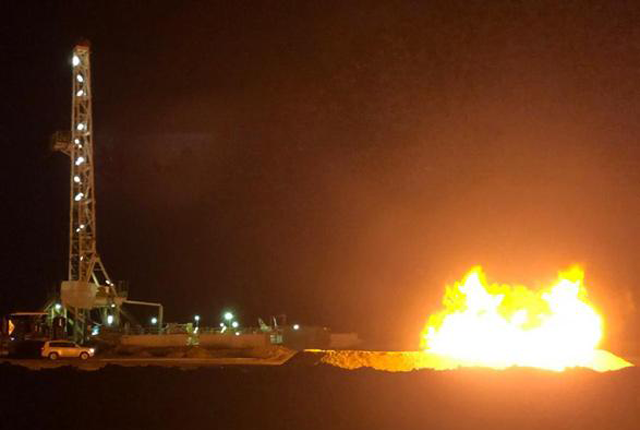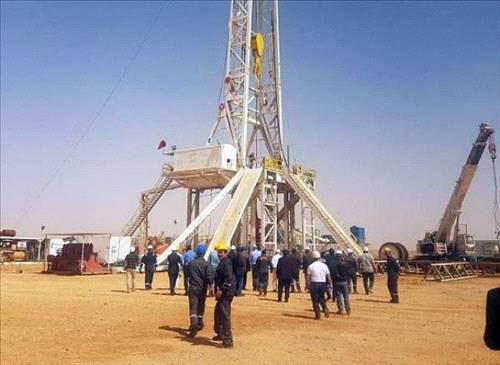You are here
Energy minister reveals 'promising' results of natural gas reserves in Risha Field
By Ahmad Khatatneh - Nov 19,2024 - Last updated at Nov 19,2024

Minister of Energy and Mineral Resources Saleh Kharabsheh (left), Minister of Government Communication and government spokesperson Mohammad Momani (centre), and Director General of the National Petroleum Company Mohammed Khasawneh, during a press conference at the Government Communication Forum, to announce the results of the exploration of natural gas reserves in the Risha Field (Petra photo)
-Risha Field estimated to contain 11.99 trillion cubic feet of reserves, 4.675 trillion cubic feet recoverable
-Natural gas from Risha Field could cut industrial energy costs by 60%
-Energy minister announces plans for 320-km gas pipeline from Risha Field
-NPC to drill 70 wells by 2029 as part of Kingdom’s energy independence strategy
AMMAN — Minister of Energy and Mineral Resources Saleh Kharabsheh on Tuesday unveiled the results of the exploration of natural gas reserves in the Risha Field.
Speaking at a press conference at the Government Communication Forum, attended by Minister of Government Communication and government spokesperson Mohammad Momani, and Director General of the National Petroleum Company (NPC) Mohammed Khasawneh, Kharabsheh said that, while initial findings on natural gas reserves in the Risha Field are promising, their contribution to the national economy depends on detailed assessments of their economic viability.
He explained that the study categorised the reserves into high, medium, and low estimates based on international standards, with the medium estimate being regarded as the most reliable.
The medium estimate suggests that the field holds 11.99 trillion cubic feet of in-place reserves, with 39 per cent or 4.675 trillion cubic feet—potentially recoverable, he said.
"Lower-end estimates indicate reserves of 9.39 trillion cubic feet, with 30 per cent recoverable (around 2.835 trillion cubic feet)."
The highest estimate places reserves at 14.6 trillion cubic feet, with a potential 43 per cent recovery rate, amounting to 6.35 trillion cubic feet, the minister said.
To maximise the potential of these reserves, Kharabsheh said that the NPC is revising its development plans, which include expanding infrastructure, intensifying drilling efforts, and establishing gas transportation networks, adding that these projects, which are expected to cost over JD2 billion, could take up to a decade to complete.
Since 2022, the government has prioritised oil and gas exploration, with the NPC leading studies in cooperation with international experts, Kharabsheh said, adding that the initial phase involved reprocessing geophysical data and constructing geological models." The final phase included reserve certification by Beicip-Franlab, a leading French energy consultancy."
The minister also said that plans were also underway to build a 320-km gas pipeline connecting the Risha Field to Al Khanasri, adding "The first phase of the pipeline will transport 150 million cubic feet of gas per day, with the second phase expanding its capacity to 500 million cubic feet daily."
He also said that the government is accelerating efforts to deliver natural gas to industrial zones and urban areas across the Kingdom, including the industrial zones of the Al Muwaqqar and Al Qastal, aiming to reduce energy costs, boost productivity, and generate employment opportunities.
Kharabsheh also highlighted the economic advantages of utilising natural gas in industrial sectors, noting that compared with other fuels, natural gas could reduce energy costs by 30 per cent relative to heavy fuel, 55 per cent compared with liquefied petroleum gas, and 60 per cent compared with diesel, which would enhance industrial competitiveness, create jobs, and contribute to overall economic growth.
He also highlighted the NPC's efforts in conducting marketing studies to attract investments in natural gas, maximise demand for the gas produced from the field, efficiently manage these quantities, diversify beneficiaries, and launch projects for gas compression, liquefaction, and transportation to gas-dependent industries.
The company has signed multiple agreements with various companies for gas supply and has entered into memorandums of understanding with investors interested in utilising gas for manufacturing, petrochemical, and basalt industries, he added.
NPC Director General Mohammad Khasawneh said that the company plans to drill 70 wells by 2029, including 26 development wells.
"This will increase daily production to 150 million cubic feet, supporting Jordan’s objectives of enhancing energy independence and fostering economic growth," Khasawneh added.
Related Articles
AMMAN — Minister of Energy and Mineral Resources Saleh Kharabsheh on Friday will inaugurate the main station for receiving compressed natura
AMMAN — Initial digging results at Well 48 in the Risha Field, eastern Jordan, show potential for increased production, the National Petrole
AMMAN — The National Petroleum Company (NPC) on Saturday announced plans to drill five to six new wells in Al Risha gas field in 2020.

















